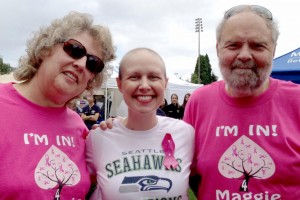When news broke last week that two triplet-bearing surrogate mothers face legal battles with parents who want them to abort one of the fetuses, the spotlight returned to the pressing debate about whether to legalize commercial surrogacy in New York state — which could occur as early as next year. Critics claim that, if allowed, the move would tempt New York women to risk their health by “renting out” their wombs or donating their eggs. Cancer victim Maggie Eastman, a 34-year-old 911 operator from Seattle, is the subject of the documentary “Eggsploitation: Maggie’s Story,” produced by theCenter for Bioethics and Culture network, a watchdog for the rights of surrogates and egg donors. Here she tells Jane Ridley her heartbreaking story about her time as a serial egg donor.
Waking up from the anesthesia, I sleepily ask the nurse how many eggs have just been harvested from my ovaries.
“You lit up like a Christmas tree!” she exclaims, referring to the ultrasound that showed I’d produced more than 20 for that particular retrieval.
Little did I know that this hyperstimulation of my reproductive system — caused by the estrogen injected into my body — was putting my health in jeopardy.
Now, 13 years after the first of my 10 egg retrievals over the span of a decade, I have been diagnosed with Stage 4 breast cancer. It has spread to my bones, lymph nodes and liver. I don’t know how much longer I have to live but, while I’m still on this Earth, I want to warn other young women that egg donation can come at a cost.
My experience began in 2002, when I was studying at Pacific Lutheran University in Tacoma, Wash. I met a woman at a party who worked at a nearby in vitro fertilization (IVF) clinic who said I’d make an ideal egg donor.
Infertility was close to my heart because some longtime friends had struggled with the condition. I loved the idea of helping desperate couples have babies of their own. Though the compensation was hardly a fortune at $1,200 per cycle, the money would help me buy books for school.
Since I was 5-foot-7, slim, well-educated and “traditionally attractive,” the coordinator assured me I was likely to get a call soon.
She was right — within weeks, I was injecting twice-daily hormones into my stomach for around 10 days, followed by a trigger shot to stimulate release of the eggs before retrieval. My ovaries swelled to the size of apples and I put on at least 10 pounds.
My parents were none too happy with my actions. My mom, a teacher, accused me of “selling her grandchildren.” But the matter was never brought up again.
At the second clinic, I was paid $2,000 each for eight retrievals between spring 2004 and August 2012. I trusted the doctor and never once thought he might be putting me in danger. I’ve since found out that the clinic ignored guidelines by the American Society for Reproductive Medicine recommending a woman should donate eggs no more than six times.
During that period, in November 2007, I married my boyfriend, Jonathan. He was supportive of my decision to continue donating my eggs, and we used the money toward a mortgage down payment — though sadly, we amicably divorced five years later.
Then, in January 2014, at age 32, it was confirmed that a lump in my breast was Stage 4 cancer. I was devastated to hear it had metastasized and, in August 2014, was given a hysterectomy — ironic, since I’d helped create an untold number of babies for strangers but would now never become a mother myself.
My oncologist was baffled because my disease — estrogen-positive, invasive ductal carcinoma — was “unheard of” in women my age and most common among post-menopausal black women.
Trouble is, since IVF and egg donation is relatively new, this area of medicine is underresearched. (When contacted by The Post, Dr. Charles L. Shapiro, director of translational breast cancer research for Mount Sinai Hospital, said: “The bulk of the literature on this topic says there is no relationship between IVF, hormone priming or egg harvesting and increasing risk of breast cancer … It’s usually not one [factor that causes breast cancer], but a whole host of different circumstances, most of which we don’t know about.” Meanwhile, Dr. Anthony Caruso, director of A Bella Baby OBGYN in Chicago and consultant to the Center for Bioethics and Culture network, says, “High-estrogen states generated artificially for women are potentially putting them at a greater risk for estrogen-related cancers.”)
‘I worry about a growing “breeder class” of women like me.’
– Maggie Eastman
As the demand for egg donors and surrogates has exploded in the past few years, I worry about a growing “breeder class” of women like me. If New York state legalizes commercial surrogacy, thousands of young women — particularly bright NYC students — might be seduced by the cash incentives and schmaltzy ads urging them to “give the gift of life” by donating their eggs to childless couples.
There’s a certain amount of shame and embarrassment going public in this way — after all, it was my decision to receive payment as a donor — but I don’t believe I gave my informed consent. I feel like I was prostituted and kept in the dark about the possible toll on my health. Any woman considering egg donation needs to step back and ask herself whether it’s worth risking her life.
